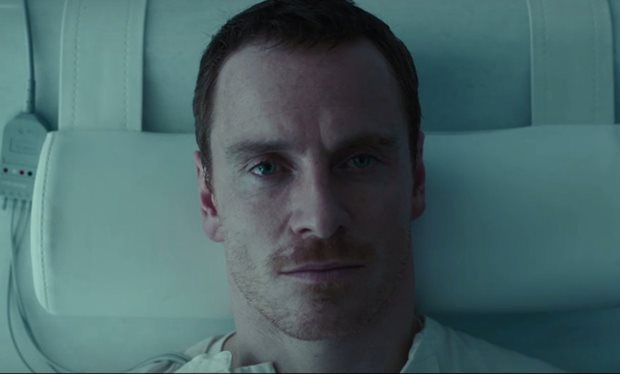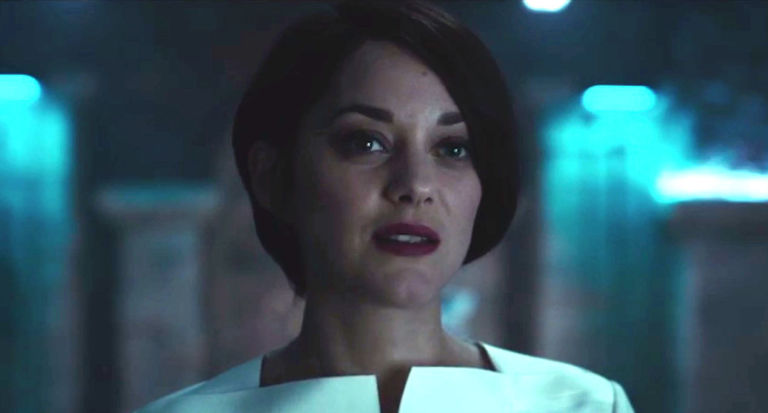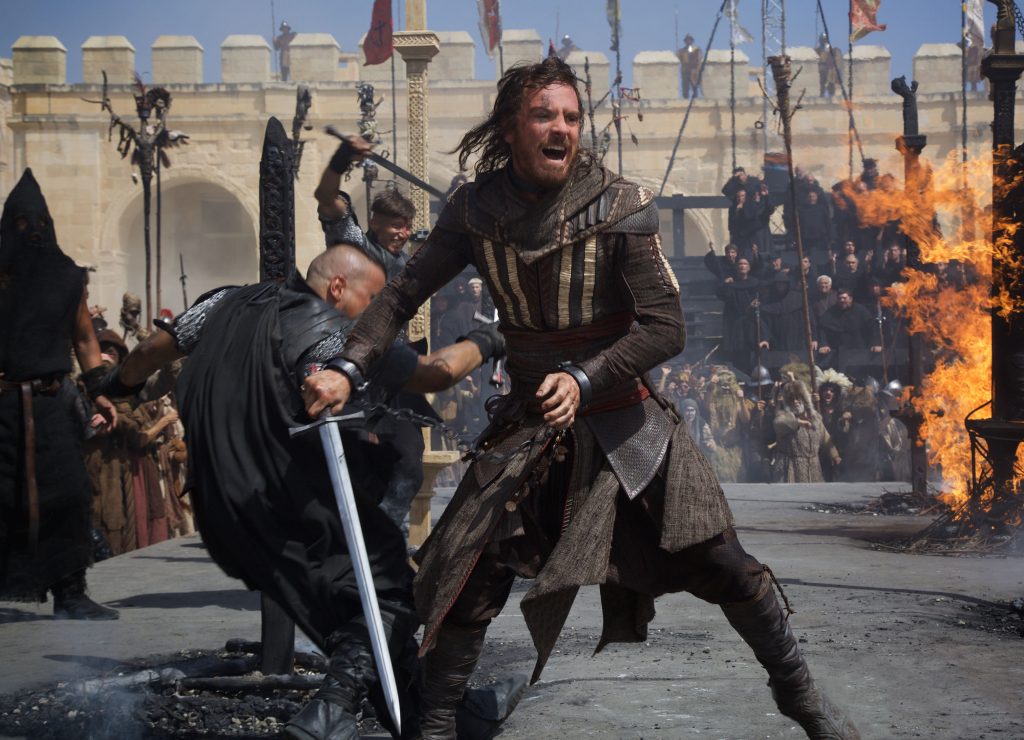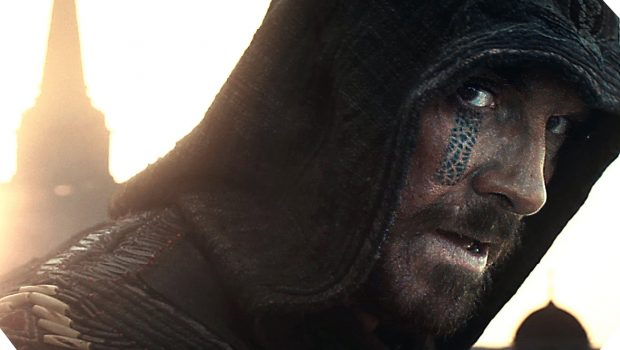Assassin’s Creed – Film Review
Reviewed by Damien Straker on the 30th of December 2016
Fox presents a film by Justin Kurzel
Produced by Jean-Julien Baronnet, Gérard Guillemot, Frank Marshall, Patrick Crowley, Michael Fassbender, Conor McCaughan and Arnon Milchan
Screenplay by Michael Lesslie, Adam Cooper and Bill Collage
Starring: Michael Fassbender, Marion Cotillard, Jeremy Irons, Brendan Gleeson, Charlotte Rampling, Michael K. Williams and Ariane Labed
Music by Jed Kurzel
Cinematography Adam Arkapaw
Edited by Christopher Tellefsen
Running Time: 116 minutes
Rating: M
Release Date: the 1st of January 2017
Game to film adaptations are a waste of time. I once wrote an essay about this, outlining the mimesis shared between contemporary films and video games, where the two mediums imitate each other and forgo their most unique properties. Films omit or interrupt action scenes to provide time to the characters and story. While video games are improving in their storytelling, they are generally less nuanced than cinema because of their heavy devotion to action. The controller cannot go cold in the hands of the player. Their input through the controller creates agency in the digital world, which makes video games idiosyncratic compared to film and television. After seeing the film Assassin’s Creed, based on Ubisoft’s bestselling game, the crisis of imitation is left unresolved as nothing in the movie overcomes the disjunction between the two mediums.
The movie’s overly digital filmic style is a sad reminder of how dull it is to watch someone else play a game you cannot control, and how the finest actors ever recruited to a video game adaptation are wasted when the material they’re served does not match their talents. If the failure of this film’s rich cast doesn’t signpost something to Hollywood then what will? Unfortunately, cynicism and marketing will continue to fuel dreck like this because money, box office and marketing are everything in Hollywood, not originality and risk. What lazier way is there to ignite the box office than to use established brands like Tomb Raider and Assassin’s Creed to draw in fans for easy money? Cynicism and exploitation are as critical as physical input to the ongoing list of failed video game adaptations.
It was also questionable adapting a series as uneven as Assassin’s Creed. It began ten years ago, meaning it’s a popular franchise but not a fresh or consistent one. Before this film, I had already played five Assassin’s Creed games, which means the filmmakers already face the hurdle of familiarity with a film version. The series is comparable to The Matrix (1999). In the first game, a bartender is kidnapped and imprisoned by a group of scientists who lock him in futuristic prison and force him to use a machine called the Animus. It’s not dissimilar to Neo jacking into the virtual world of the Matrix.
The Animus allows your character to enter the memories of his ancestors, each of whom is an assassin and many of them fight against an evil group called the Templars throughout different historical periods. The game is a wild mix of swordplay, stealth and large action set pieces, thrown together into an ambitious but shaky brew. For all the odds and ends thrown into the games, this lousy adaptation offers fans few surprises. It rehashes the first game’s ten-year-old plot, meaning the filmmakers haven’t matched the franchise’s evolution or catered to the fans by sketching a narrative with new angles. You won’t find pirates or red coats here for example.

What better way to overcome a derivative narrative than to make your film needlessly convoluted, argues Australian director Justin Kurzel. The film covers no less than three time periods in its opening, starting in Spain in the 1400s, to modern day Mexico and then to the US. In the Spanish setting, a feud plays out between the Templars and the Assassins over a silly device called the Apple of Eden. In the wrong hands, it can control freewill! Imagine Hollywood using this to make us watch crap like Assassin’s Creed every weekend. In the 1980s, a boy escapes his home in Mexico after his father kills his mother. Cheerful. Thirty years onwards, the boy grows up to be Cal (X-Men’s Michael Fassbender), an angry man on death row in the US for killing a pimp!
Cal is freed by Sofia (Marion Cotillard; why oh great one?) because she and her father (Jeremy Irons) want Cal to utilise the Animus device to tap into his assassin bloodline, not to kill the film’s scriptwriters, but to stop a prince from being assassinated and obtain the Apple of Eden. Sofia believes it can be used to stop violence in the world. If it also meant stopping movies like this it’d be impossible not to sympathise with the villains. Cal leaps into the Animus all too quickly and undertakes a series of lacklustre missions as his equally boring assassin avatar Aguilar (also played by Fassbender). Simultaneously, an uprising is planned around the prison walls of the Animus.

It’s fascinating how impersonal Creed is, transitioning Justin Kurzel from naturalist filmmaker to keyboard warrior. Kurzel started his career in Australia by making Snowtown (2011), one of the most brutal crime dramas ever committed to film. The disappointing Macbeth, which featured Fassbender and Cotillard, followed and pointlessly utilised slow-motion action scenes and orange colour filters. Kurzel has now gone out of his way to design Creed like a piece of software on a computer. One example is the use of establishment shots during the desert scenes; the camera pans and zooms around and towards the terrain at such velocity that we become all too aware of the cinematic artifice.
Additionally, the action scenes are slashed into a hurried blur of kicks and punches and people leaping between buildings in slow-motion. It might be inside the Animus machine but if nothing feels grounded or real, what do we latch onto? Kurzel can’t stimulate our eyes either, save for Cotillard’s bob cut, because there’s no line of code for “pretty”. The ancient scenes use sand and dust as muddy colour filters and the Animus prison is merely a drab, colourless cellblock, leaving nothing to please the eye. Another variable still to be programmed into the movie is “humour”. Kurzel’s self-serious treatment is both unnecessary and unintentionally comical. At one point a henchman screams out “Noooo” in slow-motion, which tickled some audience members awake and had them howling with laughter.

Creed is also populated by characters who have no right to look at you let alone take up two hours of your time. Marion Cotillard, Michael Fassbender and Jeremy Irons, along with a supporting cast featuring Michael Kenneth Williams, Brendan Gleeson (imagine him leaping between rooftops) and Charlotte Rampling, are fine actors wasting precious hours of their lives channelling their inner twelve-year-olds. Fassbender does wounded well enough in most films but can Hollywood write him a part where he does something other than snarl at people? Another laughable point: when he’s asked about how he feels about his father’s actions he replies: “I feel like killing him!” Yawn. He also surprises us by describing himself as an aggressive person! Robot Kurzel does not compute subtle human emotions either. His quick cuts between the assassin scenes to Cal in the Animus are useless without an emotional reaction shot. All we’re watching is a shirtless grouch playing with the most high-tech Wii toy you’ve ever seen.
Disappointingly, Cotillard is kept in cotton wool until someone drops the exposition flag for her to run in and explain why apples rule the world. True to her class, Cotillard shows Sofia as having sympathy for Cal and in an end scene she proves that not every actor in this film is an android needing anger management. At least her character has dialogue, which is more than a near-wordless female assassin (Ariane Labed) in the Animus programme, who is given zero weight aside from how hard she punches. Its dishonest to tell these actors or the audience that Creed is asking questions about the cost of stopping violence. Being a video game adaptation undermines the statement it was supposed to make on the subject. Violence is a staple of all three films Kurzel has made so far, but now he’s commercialising and packaging it to sell video games. Truthfully, the stunning reversal into hypocrisy began when Kurzel tried turning Macbeth into a slow-motion action star. Or better put: “Direness, familiar to my slaughterous thoughts, Cannot once start me”. The director’s adolescence leaves only one real question: how entertaining is it to watch someone else throw kicks and punches to save the world’s most important piece of fruit?
Summary: It’s fascinating how impersonal Creed is, transitioning Justin Kurzel from naturalist filmmaker to keyboard warrior.







